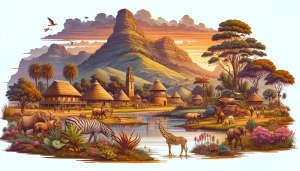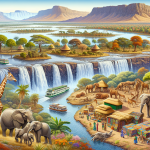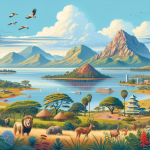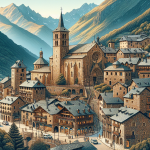Exploring the Enchanting Kingdom of Eswatini (Swaziland)
Eswatini, formerly known as Swaziland, is a small, landlocked kingdom in Southern Africa that is often overshadowed by its larger neighbors, South Africa and Mozambique. Despite its size, Eswatini offers a rich tapestry of culture, history, and natural beauty that beckons travelers seeking an authentic African experience. This charming nation, with its rolling hills, lush valleys, and vibrant cultural heritage, provides a unique opportunity to explore a less-commercialized side of Africa. From the bustling markets of Mbabane to the serene landscapes of the Mlilwane Wildlife Sanctuary, Eswatini is a hidden gem waiting to be discovered. In this comprehensive guide, we will delve into the various facets of Eswatini, exploring its history, culture, natural attractions, and travel tips to ensure you have an unforgettable journey through this enchanting kingdom.
The Captivating History and Culture of Eswatini
A Brief Historical Overview
Eswatini’s history is deeply rooted in the traditions of the Swazi people. The kingdom was established in the mid-18th century by King Ngwane III, and it has managed to retain its independence through a combination of strategic alliances and sheer determination. The nation’s name was officially changed from Swaziland to Eswatini in 2018, a move that signified a reclaiming of cultural identity and heritage. Visitors to Eswatini can witness the legacy of its past in various historical sites and cultural practices that are still very much alive today.
Cultural Festivals and Traditions
One of the most compelling reasons to visit Eswatini is to experience its vibrant cultural festivals. The Reed Dance (Umhlanga) and the Incwala Ceremony are two of the most significant events in the Swazi cultural calendar. The Reed Dance is a celebration of maidenhood and chastity, where thousands of young Swazi women gather to dance and present reeds to the Queen Mother. The Incwala Ceremony, on the other hand, is a sacred event that involves the entire nation and celebrates the harvest and the renewal of the king’s power. These festivals offer a unique glimpse into the rich cultural tapestry of Eswatini and are not to be missed.
Natural Wonders and Wildlife of Eswatini
National Parks and Reserves
Eswatini is home to several national parks and wildlife reserves that offer a haven for nature enthusiasts and wildlife lovers. Hlane Royal National Park, the largest park in Eswatini, is famous for its populations of lions, elephants, and rhinos. The park provides various safari options, including self-drive and guided tours, allowing visitors to get up close and personal with Africa’s iconic wildlife.
Mlilwane Wildlife Sanctuary is another must-visit destination in Eswatini. Located in the Ezulwini Valley, this sanctuary is known for its diverse flora and fauna, including zebras, hippos, and numerous bird species. The sanctuary offers a range of activities such as horseback riding, mountain biking, and guided nature walks, making it an ideal spot for adventure seekers.
Scenic Landscapes
The natural beauty of Eswatini extends beyond its wildlife. The Lebombo Mountains and the Malolotja Nature Reserve offer stunning landscapes that are perfect for hiking and exploration. The Malolotja Nature Reserve, in particular, is renowned for its dramatic scenery, including waterfalls, gorges, and the impressive Malolotja Falls. This reserve is a paradise for hikers and nature lovers, offering a network of trails that cater to all levels of fitness and experience.
Sibebe Rock, one of the world’s largest exposed granite domes, is another natural wonder that should be on every traveler’s itinerary. The rock offers challenging hikes and unparalleled views of the surrounding countryside, making it a rewarding experience for those willing to make the climb.
Exploring Eswatini’s Towns and Cities
Mbabane: The Capital City
Mbabane, the capital of Eswatini, is a bustling city that serves as an excellent starting point for exploring the kingdom. The city offers a mix of modern amenities and traditional markets, providing a glimpse into the daily life of the Swazi people. The Mbabane Market is a vibrant hub where you can find everything from fresh produce to handmade crafts, making it an ideal place to shop for souvenirs and immerse yourself in local culture.
Manzini: The Heartbeat of Eswatini
Manzini, often referred to as the commercial center of Eswatini, is another city worth exploring. Known for its lively atmosphere, Manzini is home to the Manzini Market, one of the largest and busiest markets in the country. Here, you can experience the hustle and bustle of everyday life, sample local cuisine, and purchase traditional Swazi crafts. The city also hosts various cultural events and festivals, providing an excellent opportunity to experience Swazi culture firsthand.
Ezulwini Valley: The Valley of Heaven
The Ezulwini Valley, also known as the “Valley of Heaven,” is a picturesque region that offers a blend of natural beauty and cultural attractions. The valley is home to several luxury resorts, cultural villages, and craft markets, making it a popular destination for both relaxation and exploration. Key attractions in the Ezulwini Valley include the Mantenga Cultural Village, where visitors can learn about traditional Swazi life and customs, and the Swazi Candles Craft Market, which features colorful handcrafted candles and other artisanal products.
Practical Travel Tips for Visiting Eswatini
When to Visit
The best time to visit Eswatini depends on what you want to experience. The dry season, from May to September, is ideal for wildlife viewing as animals gather around water sources. This period also offers cooler temperatures, making it perfect for outdoor activities like hiking and exploring the national parks. The wet season, from October to April, brings lush landscapes and vibrant flora, making it a great time for nature enthusiasts and photographers.
Getting Around
Eswatini is a small country, and getting around is relatively easy. The road network is well-maintained, and renting a car is a popular option for travelers who want the freedom to explore at their own pace. Public transportation, including minibuses and taxis, is also available and provides an affordable way to get around the major towns and cities. For those looking to travel between Eswatini and neighboring countries, several border posts offer convenient access, with the most popular entry points being from South Africa and Mozambique.
Accommodation Options
Eswatini offers a range of accommodation options to suit all budgets and preferences. From luxury resorts and boutique hotels in the Ezulwini Valley to budget-friendly guesthouses and backpacker lodges in Mbabane and Manzini, there is something for everyone. Many of the national parks and wildlife reserves also offer unique accommodation options, such as safari lodges and eco-friendly cabins, providing an immersive experience for nature lovers.
Health and Safety
Eswatini is generally a safe destination for travelers, but it is essential to take standard precautions to ensure a smooth and enjoyable trip. Make sure to stay informed about any travel advisories and follow local guidelines. It’s also a good idea to carry a basic first-aid kit and any necessary medications, as medical facilities in remote areas may be limited. Additionally, travelers should take precautions against mosquito bites to reduce the risk of malaria, especially if visiting during the wet season.
Eswatini’s Unique Cuisine and Culinary Delights
Traditional Swazi Dishes
Eswatini’s cuisine is a reflection of its rich cultural heritage and diverse culinary influences. Traditional Swazi dishes are hearty and flavorful, often featuring ingredients such as maize, beans, and fresh vegetables. One of the most popular dishes is sishwala, a thick porridge made from maize meal, often served with meat or vegetable stew. Another traditional favorite is emasi, a fermented milk dish that is commonly enjoyed with porridge or as a refreshing beverage.
Dining Experiences
While in Eswatini, be sure to explore the local dining scene and sample a variety of Swazi dishes. Many restaurants and eateries in Mbabane, Manzini, and the Ezulwini Valley offer a range of traditional and contemporary cuisine, providing a delicious introduction to the flavors of Eswatini. For a truly authentic experience, consider visiting a local homestead or cultural village, where you can enjoy a traditional meal prepared by Swazi hosts and learn about the culinary traditions that have been passed down through generations.
Adventure Activities and Outdoor Experiences
Hiking and Trekking
Eswatini’s diverse landscapes offer numerous opportunities for hiking and trekking enthusiasts. The Malolotja Nature Reserve is one of the top hiking destinations in the country, with trails that range from easy walks to challenging multi-day treks. The reserve’s rugged terrain, combined with its stunning scenery and abundant wildlife, makes it a must-visit for outdoor enthusiasts.
For those looking for a less strenuous hike, the Mantenga Nature Reserve offers several well-marked trails that lead to beautiful waterfalls and scenic viewpoints. The reserve is also home to the Mantenga Cultural Village, providing an excellent opportunity to combine a cultural experience with outdoor adventure.
Water Sports and Activities
Eswatini’s rivers and dams provide a range of water-based activities for adventure seekers. The Maguga Dam, located in the northern part of the country, is a popular spot for fishing, boating, and kayaking. The dam’s serene waters and picturesque surroundings make it an ideal destination for a relaxing day out on the water.
For a more adrenaline-pumping experience, the Great Usutu River offers exciting opportunities for white-water rafting and tubing. The river’s rapids provide a thrilling ride for adventure enthusiasts, while the stunning scenery along the riverbanks adds to the overall experience.
Wildlife Safaris
No visit to Eswatini would be complete without experiencing a wildlife safari. The country’s national parks and reserves offer a range of safari options, from self-drive tours to guided game drives. Hlane Royal National Park is one of the best places to see the “Big Five” (lion, elephant, buffalo, leopard, and rhino), while Mlilwane Wildlife Sanctuary provides a more relaxed safari experience with its diverse range of animals and bird species.
For a unique and memorable safari experience, consider taking a horseback safari at Mlilwane Wildlife Sanctuary. Riding through the reserve on horseback allows you to get closer to the wildlife and enjoy a different perspective of the stunning landscapes.
Shopping for Souvenirs and Handicrafts
Craft Markets and Artisans
Eswatini is renowned for its vibrant craft markets and talented artisans. The Swazi Candles Craft Market, located in the Malkerns Valley, is one of the most popular places to shop for unique souvenirs. The market features a variety of handcrafted candles in vibrant colors and intricate designs, as well as other artisanal products such as textiles, pottery, and jewelry.
The Ezulwini Valley Craft Market is another excellent destination for souvenir shopping. Here, you can find a wide range of traditional Swazi crafts, including wooden carvings, beadwork, and woven baskets. The market also offers the opportunity to meet local artisans and learn about the traditional techniques used to create these beautiful items.
Supporting Local Communities
When shopping for souvenirs in Eswatini, consider purchasing items from fair-trade organizations and cooperatives that support local communities. These organizations ensure that artisans receive fair compensation for their work, helping to sustain traditional crafts and improve the livelihoods of local families. By supporting these initiatives, you can take home a meaningful memento of your trip while making a positive impact on the communities you visit.
Final Thoughts
Eswatini, with its rich cultural heritage, stunning landscapes, and warm hospitality, is a destination that offers something for every traveler. Whether you’re seeking adventure, cultural immersion, or simply a relaxing escape, this enchanting kingdom has it all. As you explore the bustling markets, hike through scenic nature reserves, and participate in vibrant cultural festivals, you’ll gain a deeper appreciation for the beauty and diversity of Eswatini. So pack your bags, set your sights on this hidden gem, and prepare for an unforgettable journey through the heart of Southern Africa.
For more detailed information on planning your trip to Eswatini, visit the official tourism website of Eswatini: Eswatini Tourism.








